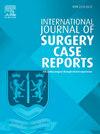Laparoscopic surgery for impacted dentures in the descending colon: A case report
IF 0.6
Q4 SURGERY
引用次数: 0
Abstract
Introduction and importance
Denture ingestion, commonly seen in older adults, can also occur in younger individuals. Most dentures require intervention as they cannot be excreted naturally. We report a case of a young male undergoing laparoscopic surgery to remove dentures impacted in the descending colon two months post-ingestion.
Case presentation
A 30-year-old male presented with intermittent left lower quadrant abdominal pain for three days. He had accidentally swallowed his dentures two months earlier. Abdominal X-ray showed a radiopaque foreign body in the descending colon. Endoscopic retrieval attempts failed, necessitating urgent surgery. The dentures were removed successfully through laparoscopic surgery, and the perforation was closed using continuous horizontal PDS 4.0 sutures. The postoperative course was uneventful and the patient was discharged on postoperative day four.
Clinical discussion
Denture ingestion poses a significant risk due to the nature of the object, often requiring removal as it cannot pass through the gastrointestinal tract. Removable dentures are a known risk factor for such accidents. Diagnosis typically involves abdominal X-rays or CT scans. Endoscopic retrieval is often attempted first but carries a risk of perforation, which may require emergency surgical intervention.
Conclusion
Surgical approaches depend on the location and extent of perforation and the patient's abdominal condition. Early laparoscopic intervention should be considered in cases where surgery is indicated, as it offers a minimally invasive and effective solution.
腹腔镜手术治疗降结肠内的假牙撞击:病例报告
本文章由计算机程序翻译,如有差异,请以英文原文为准。
求助全文
约1分钟内获得全文
求助全文
来源期刊
CiteScore
1.10
自引率
0.00%
发文量
1116
审稿时长
46 days

 求助内容:
求助内容: 应助结果提醒方式:
应助结果提醒方式:


